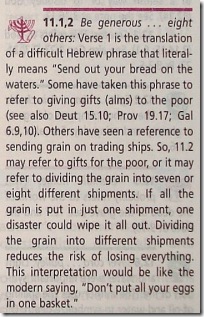Nathan has asked
John and myself to post about Psalm 8:5 in Hebrews 2:7. This is a fascinating issue. I will only look at a few points relevant to the Greek version of this verse. First, the author of Hebrews quotes exactly from the copy of the LXX as we know it today.
ἠλάττωσας αὐτὸν βραχύ τι παρ ἀγγέλους Psalm 8:5
ἠλάττωσας αὐτὸν βραχύ τι παρ' ἀγγέλους Hebrews 2:7
But the Hebrew is
vattechassereihu me'at, mei'elohim
You have made him a little lower than Elohim
The King James creates an agreement between the passage in the Psalms and in Hebrews.
For thou hast made him a little lower than the angels, Ps. 8:5
Thou madest him a little lower than the angels; Hebrews 2:7
It is worth noting that the Vulgate has "angels" while Jerome's Iuxta Hebraicum has "God" and the Pagnini translation has "angels" again (Excuse my English). Of the Reformation versions, we see,
"God" Luther, Geneva, ERV, RSV, NRSV
"angels" Coverdale, Bishop's, KJV
"heavenly beings" ESV, (T)NIV
As an aside, this might point to Luther and Geneva favouring the Iuxta Heb. or the Hebrew itself, and Coverdale depending more on Pagnini. However, the translation that Nathan points to uses "the powers that be" for
elohim. Perhaps that is the meaning suggested by the use of "angels" in Greek. There is a suggestion that the meaning of
elohim is related to that of ἐξουσία in Rom. 13:1
Everyone must submit himself to the governing authorities ἐξουσίαις
It seems that in Rom. 8:38, ἄγγελοι (angels) are related to ἀρχαὶ (principalities) and δυνάμεις (powers).
For I am persuaded, that neither death, nor life, nor angels, nor principalities, nor powers, nor things present, nor things to come, Rom. 8:38.
It is also worth noting that the LXX translates
elohim as "angels" on other occasions as well, notably Deut. 32:43 and Psalm 97:7. This is then quoted in Hebrews 1:6,
Let all God’s angels worship him.
So, when we see "angels" in this verse, it is a translation of
elohim. Is the author of Hebrews saying that the
elohim worship Christ? I hope this provides some background to Nathan's post and provokes a little thought about
elohim and "angels." I have not commented on the other aspect of this post, that the verb should read, "he requires little."
Nathan has written a post presenting the possible translation,
And You made him so that he requires little from the powers that be. Ps. 8:5.



